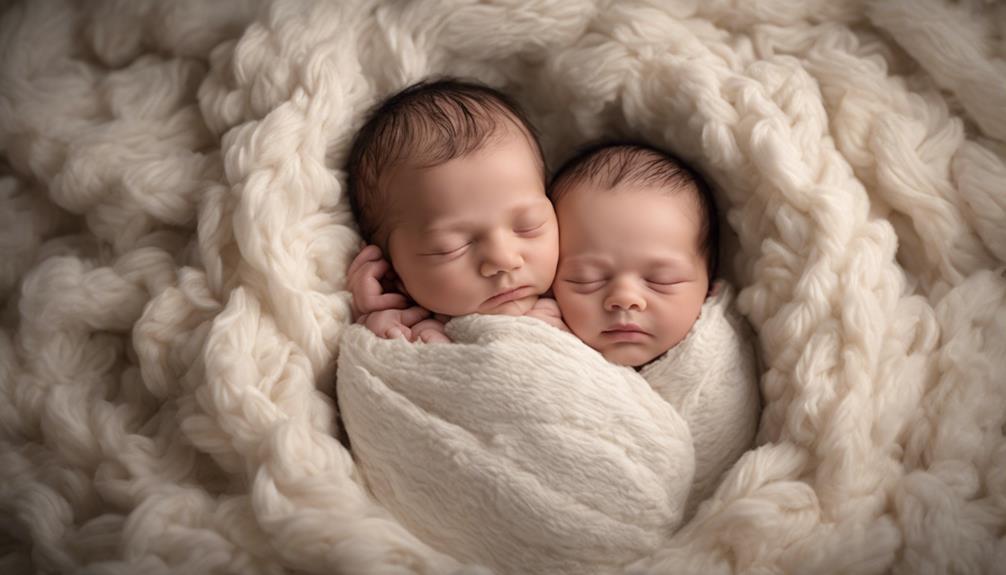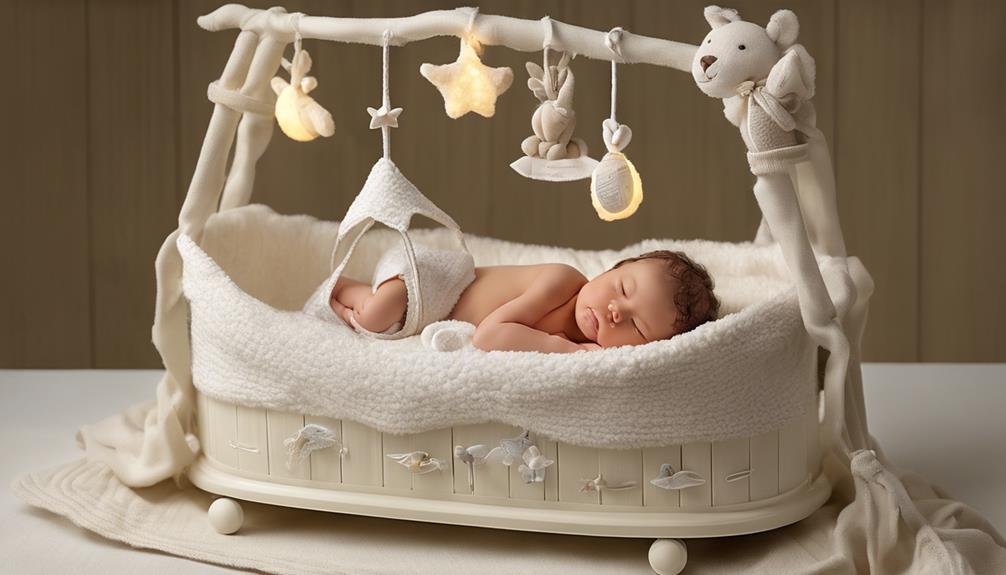As we explore the phenomenon of newborns making sounds in their sleep, a common theory suggests that these noises could be a sign of discomfort or distress.
However, there is more to this intriguing topic than meets the eye.
Have you ever wondered why your little one seems to be a symphony of sounds during naptime or nighttime slumber?
Let's unravel the mysteries behind these vocalizations that newborns produce while in the land of dreams.
Key Takeaways
- Sleep sounds in newborns reflect normal physiological processes like respiratory and digestive system development.
- Newborns use sleep sounds to communicate needs and self-soothe, strengthening caregiver-baby bonds.
- Digestive system immaturity and respiratory system development contribute to various sleep noises.
- Active REM sleep phases in babies aid in brain development, memory consolidation, and cognitive growth.
Normal Physiological Processes
Newborns produce a variety of sounds during sleep due to the ongoing development of their respiratory and digestive systems. These noises are a normal part of their physiological processes as they adapt to the world outside the womb. As babies spend a significant amount of time in active REM sleep, their sleep sounds can be more pronounced and varied. The whistling, snorting, gurgling, and even occasional crying sounds heard during sleep stages are usually nothing to be alarmed about; they're commonly linked to nasal congestion, immature muscles, and the natural changes that occur during sleep.
The respiratory system of newborns is still maturing, which can result in the production of noises like snorts and whistles as they breathe. Similarly, their digestive system is also developing, leading to gurgling sounds as food moves through their tiny bodies. These sleep sounds are indicators of the intricate and fascinating processes happening within your baby as they grow and thrive.
Communication and Self-Soothing
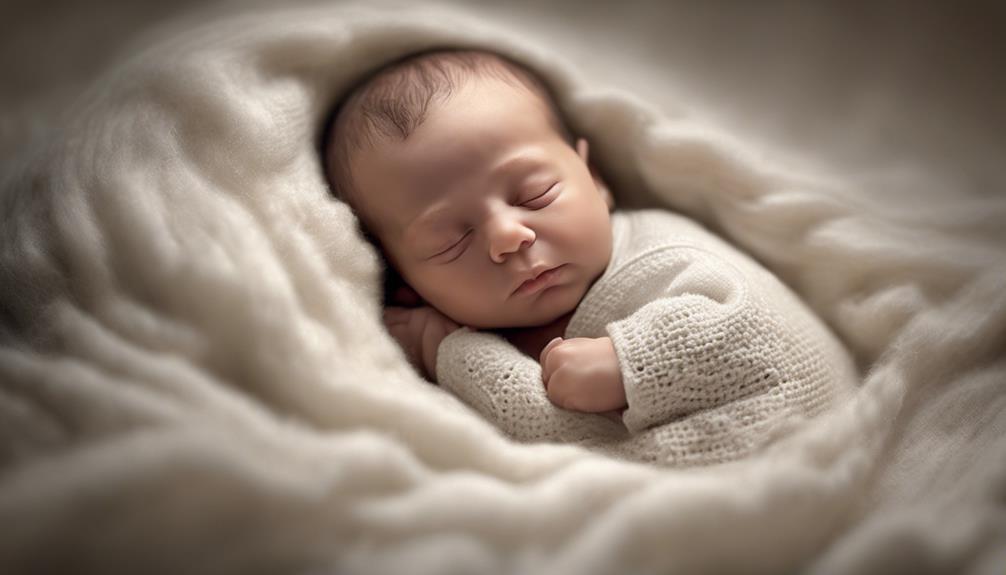
As babies make sounds in sleep as a means of communication and self-soothing, these vocalizations offer valuable insights into their needs and comfort levels. Newborns use sounds to communicate their desires, whether it's hunger, discomfort, or simply the need for reassurance. These noises can range from gentle coos to more urgent cries, each carrying a distinct message for attentive parents. Self-soothing techniques like sucking on fingers or pacifiers often accompany these sleep sounds, providing babies with a sense of security and relaxation.
Understanding a baby's communication through sleep sounds can help caregivers navigate their sleep patterns and responses more effectively. By listening closely to these vocalizations, parents can decipher whether the baby is shifting between sleep cycles, seeking comfort, or signaling a need for intervention. Being attuned to these cues enables caregivers to provide timely assistance, whether it involves a diaper change, feeding, or a soothing touch. Ultimately, recognizing and responding to a newborn's sleep sounds promotes a deeper bond and fosters a sense of security for the little one.
Digestive System Activity

How does the immaturity of a newborn's digestive system contribute to the sounds they make during sleep?
Babies' digestive systems are still developing, leading to various noises like gurgling, rumbling, and even grunting during sleep. Gas buildup and bowel movements can occur while they're resting, causing audible sounds.
The developing pelvic floor and tummy muscles play a role in these digestive activities, contributing to the noises we hear. As a result of the immaturity of their digestive system, newborns may also make rooting noises as they adjust to feeding and digestion.
These noises are a natural part of a baby's development and don't necessarily indicate any issues. It's essential for caregivers to understand that these sounds are normal as the baby's digestive system matures.
Development of Respiratory System
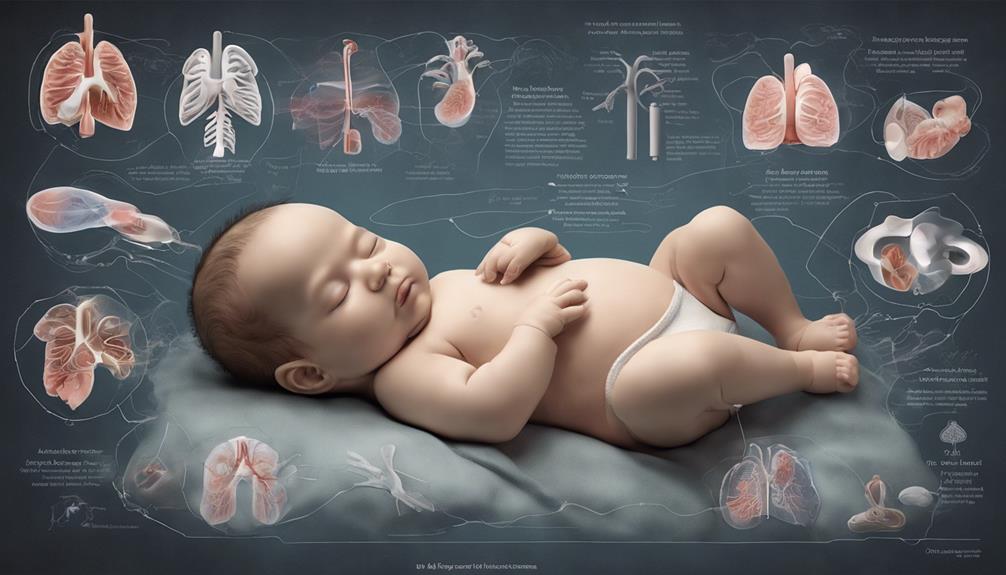
The noises heard during a newborn's sleep are influenced by the ongoing development of their respiratory system, which involves the adjustment to breathing air and the maturation of smaller airways and nasal breathing.
- The immature respiratory system in newborns can lead to noisy breathing and occasional pauses in breathing during sleep.
- Baby sleep sounds are often related to the change of the respiratory system to breathing air for the first time.
- Noises in newborn sleep can be caused by the change from fluid-filled lungs in the womb to air-filled lungs after birth.
These baby noises are a normal part of their developing respiratory system as it adapts to life outside the womb. The sounds may seem concerning at times, but they're usually part of the maturation process. Understanding that these noises are part of the adjustment to breathing air can provide reassurance to parents as they witness their newborn's respiratory system grow and develop.
Dreaming and Active Sleep Phases
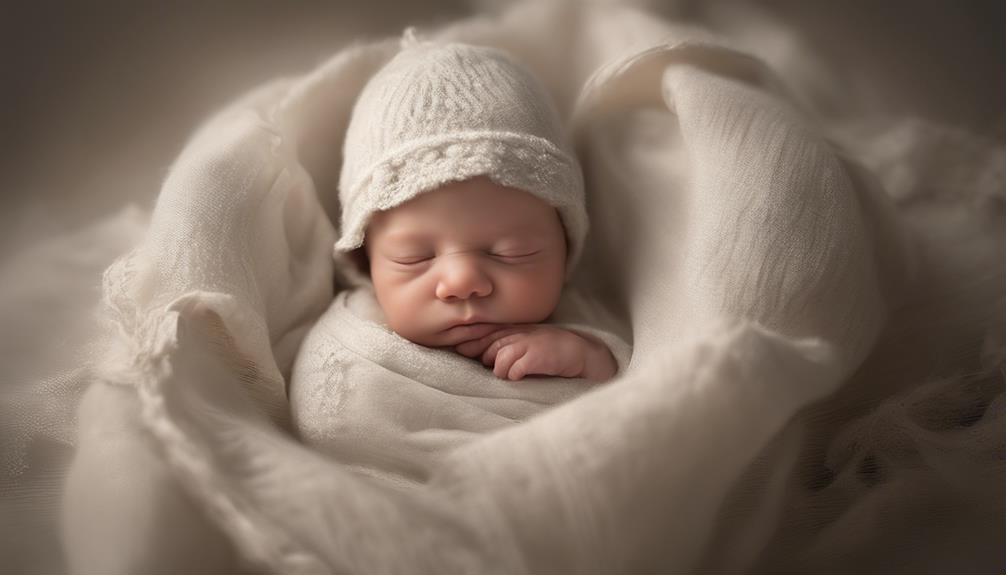
Exploring the phenomenon of dreaming and active sleep phases in newborns reveals essential insights into their cognitive development and overall growth. Babies spend a significant amount of time in active REM sleep, which is important for processing information and potentially dreaming.
During these active sleep phases, infants may exhibit twitchiness, irregular breathing, and make various sleep sounds like grunts, groans, and gurgling noises. This period of active REM sleep is essential for brain development, memory consolidation, and forming neural connections that aid in cognitive development.
Infants go through short sleep cycles, alternating between deep sleep and active REM sleep, where dreaming occurs. These noisy breathing patterns and sleep noises are natural manifestations of their brain activity during these phases.
Understanding the importance of active sleep in babies sheds light on how their brains are constantly working to process stimuli and form essential connections for their growth and development.
Frequently Asked Questions
Why Does My Newborn Make a Lot of Noises When He Sleeps?
We notice our newborn making lots of noises during sleep. It's common for newborns to be vocal in their sleep due to developing systems. Their small nasal passages and swallowing air can lead to the sounds we hear.
Why Does My Baby Grunt and Squirm All Night?
We grunt and squirm at night because our immature muscles in the pelvic floor and abdomen help regulate breathing and bowel movements. It's our way of signaling effort to pass gas, stool, or find comfort in different sleep stages.
What Is Grunting Syndrome in Newborns?
We've all heard of grunting syndrome in newborns. It's those repetitive, low-pitched sounds during sleep. Babies do this to keep their airways open. It's a part of their growth and usually goes away on its own.
Why Do Babies Whimper in Their Sleep?
Babies whimper in their sleep as they shift between sleep stages. It's a sign of processing information and dreams during active REM sleep. Whimpering is normal, reflecting internal states or helping babies self-soothe.
Conclusion
To sum up, it's completely normal for newborns to make sounds in their sleep for a variety of reasons. Did you know that newborns spend up to 70% of their sleep time in REM (rapid eye movement) sleep, which can lead to twitchiness and irregular breathing?
These sounds are a natural part of their development and shouldn't cause concern for parents. Trust in your baby's natural sleep patterns and consult a healthcare professional if you have any worries.
